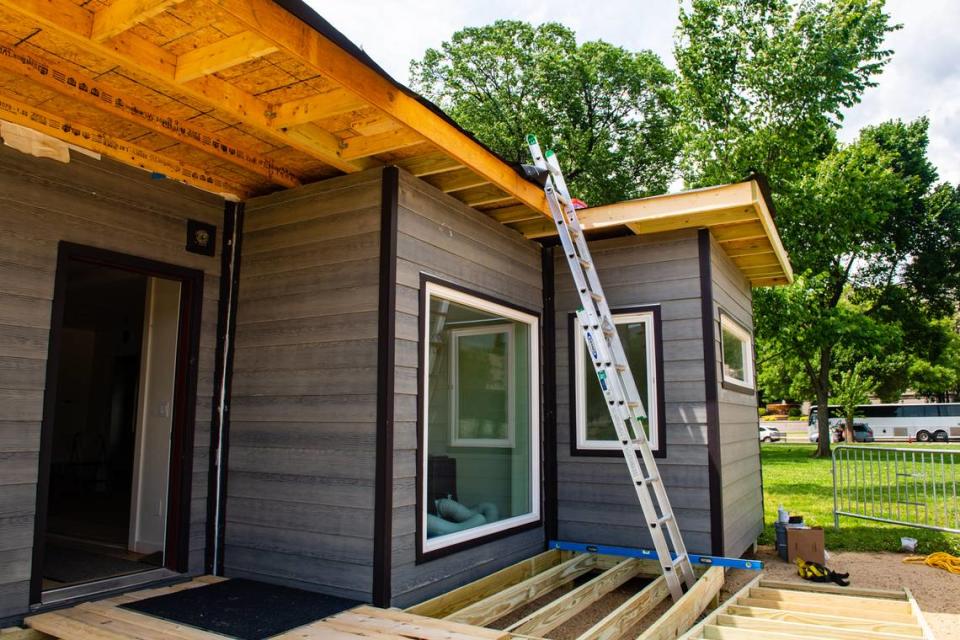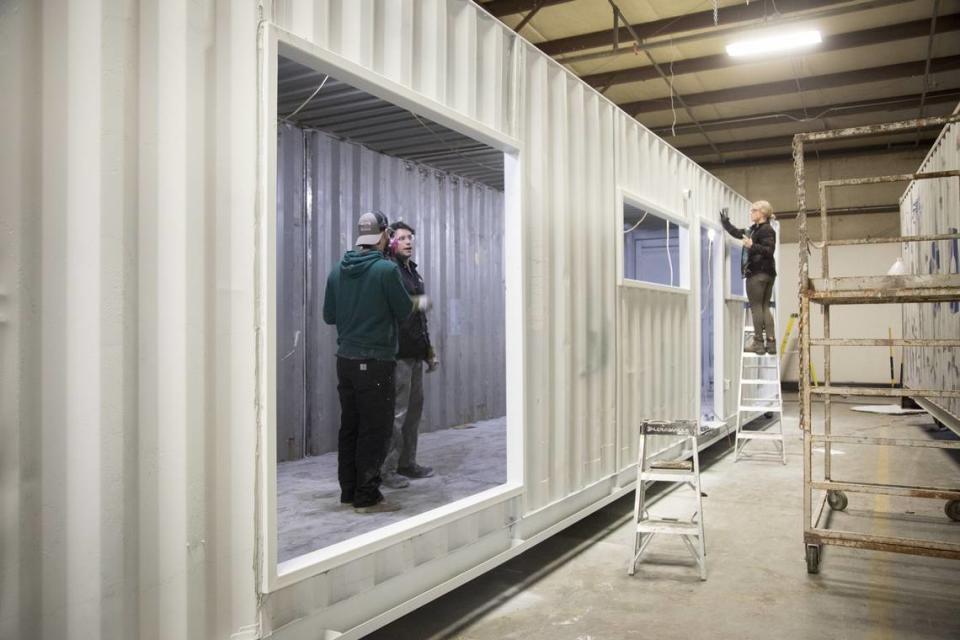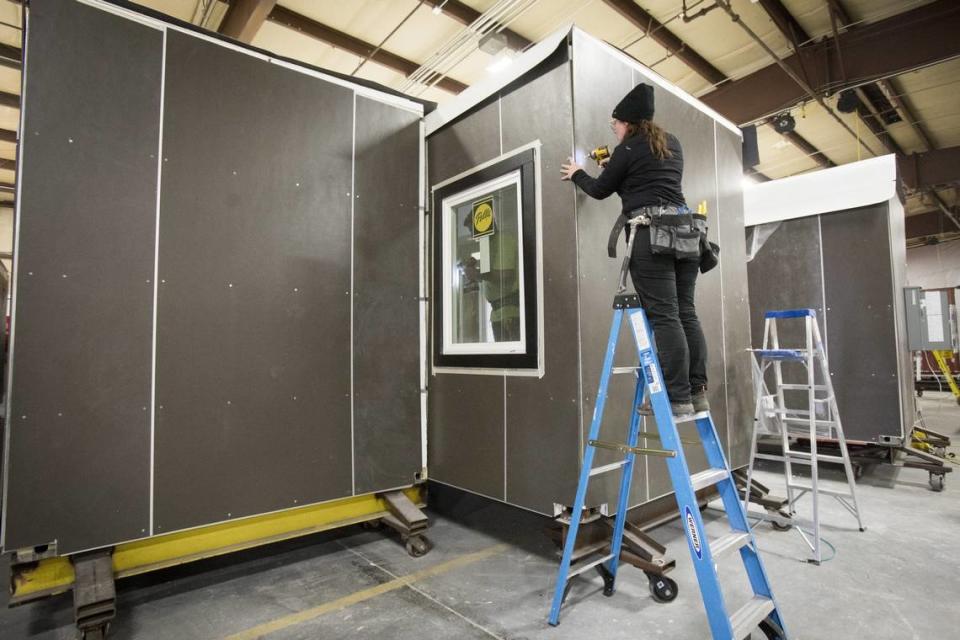This Boise company made a name for itself by building container homes. Where is it now?
A Boise startup that built homes from shipping containers rose to national acclaim five years ago.
Today, the company is in transition.
In 2019, workers at IndieDwell drove one of its steel prototypes from Idaho to the National Mall in Washington, D.C., to be displayed at an innovative housing show with a view of the Washington Monument. The shipping-container home manufacturer had caught the attention of then-Housing and Urban Development Secretary Ben Carson, who later unloaded praise while touring the company’s first factory in Caldwell.
“My expectation when I heard about container homes is that they would look like containers that somebody had painted over and put a few amenities in,” Carson said while walking through a three-bedroom shipping-container home. “This is completely different. This is transformative, and it looks like a small site-built home. It’s been done very well and (there’s) a lot of creativity involved here.”
Carson’s visit came amid a flurry of news stories about the startup, including a feature in Business Insider and a mention in The New York Times, which noted the company’s commitment to sustainability and to building affordable housing units as housing costs skyrocketed nationwide.
The price of one of IndieDwell’s two-bedroom, one-bath, 640-square-foot homes was $65,000 uninstalled, the Statesman reported in 2018.

IndieDwell homes a ‘really innovative product’
At first, the concept appeared to be working. It was highlighted in a January 2019 article in the Statesman.
“IndieDwell has developed a really innovative product,” said Brian Woodward, then-chief operating officer of Leap Housing, a Boise-based nonprofit that creates affordable housing. “I think they will be kind of a living museum that people will be able to see right in our backyard.”
The Statesman that month spoke to one Boise couple who downsized from their home in East Boise to move into one of IndieDwell’s smaller, energy-efficient steel containers.
The family added a separate garage and a 480-square-foot apartment, also made from shipping containers.
“We were really taken by the concept,” Jo Burgoon told the Statesman. “It does a really good job of keeping the temperature constant.”
But not long after, the company’s Caldwell factory, at 3520 Arthur St., closed in 2021, laying off 61 employees. The second factory the company had opened, in Pueblo, Colorado, in 2020, closed in May 2023 with no announced reopening date, the Pueblo Chieftan reported.

IndieDwell moves its Boise headquarters
Despite the sudden closures elsewhere, this past summer IndieDwell held a ribbon-cutting ceremony for a new manufacturing plant in the Imperial Valley in Southern California.
Back in Boise, where the company is headquartered, its future seemed unknown.
When a Statesman reporter visited the company’s corporate address at 217 S. 11th Street in Boise in late November, an employee of a separate company housed in the same building said IndieDwell, once located on the second floor, had moved out about two weeks prior. He wasn’t aware of any forwarding address, and the space appeared vacated.
Calls to the company’s phone number were greeted with an automated message: “We could not complete your call. Please try again.”
Emails to several officials listed on the company’s website each got a similar automated response that read the message couldn’t be delivered because the address couldn’t be found. Scott Flynn, one of IndieDwell’s founders, did not respond to phone calls from the Statesman. Flynn started the business as a public benefit corporation in 2016 with Pete Gombert, who also could not be reached.
But after this story was published online, Scott Beecham, vice president of development at IndieDwell, contacted the Statesman to say the company is “alive and well; not vanishing.” The company is now located at 5513 W. Kendall St. in Boise, he said.
He said its phone number should be operational, and wasn’t sure why calls to the line or emails to the company weren’t going through.

East Coast Investment firm buys IndieDwell
IndieDwell’s website hadn’t been updated in years. Neither had its social media pages.
The website still listed Chris Blanchard, former sales and marketing manager at IndieDwell in Boise, as its spokesperson. Blanchard was laid off over two years ago when the Caldwell factory closed. He told the Statesman that the company, once a vanguard in affordable housing solutions, struggled with high costs and underpricing its projects.
“The idea was to provide low-cost affordable housing quickly in markets across the country that had high demand,” Blanchard said by phone. “Except they just ended up underpricing everything, and that led to problems.”
After this story was first published, mentions of Blanchard, as well as biographies and contact information for the two founders, were removed from the company’s website.
“If you pull up our website, currently, it shows our leadership, which, for example, does not include Chris Blanchard,” Beecham said Thursday by phone, blaming the discrepancy on a faulty link. “That is way outdated.”
He said the company was acquired by Palm Ventures, a Connecticut-based investment firm, in late October. The transition required a change of location into an “opportunity zone” and a name change to IndieDwell Collective, Beecham said. Opportunity zones are designated by the state to drive economic development in certain areas.
He said IndieDwell still has the same management team and maintains its original mission and focus.
Beecham also noted that while the company did furlough staff at the Pueblo factory, it later hired some of them back. The factory is still operational, he said.
“We have to update everything because of the change in ownership,” he said. “That’s the big disconnect here. IndieDwell is in good standing. I don’t want people to lose sight of the good work we’re doing.”
NFL star from Portland invests in this Boise affordable housing company
Amid widespread housing deficit, 11 new affordable homes are coming to West Boise

